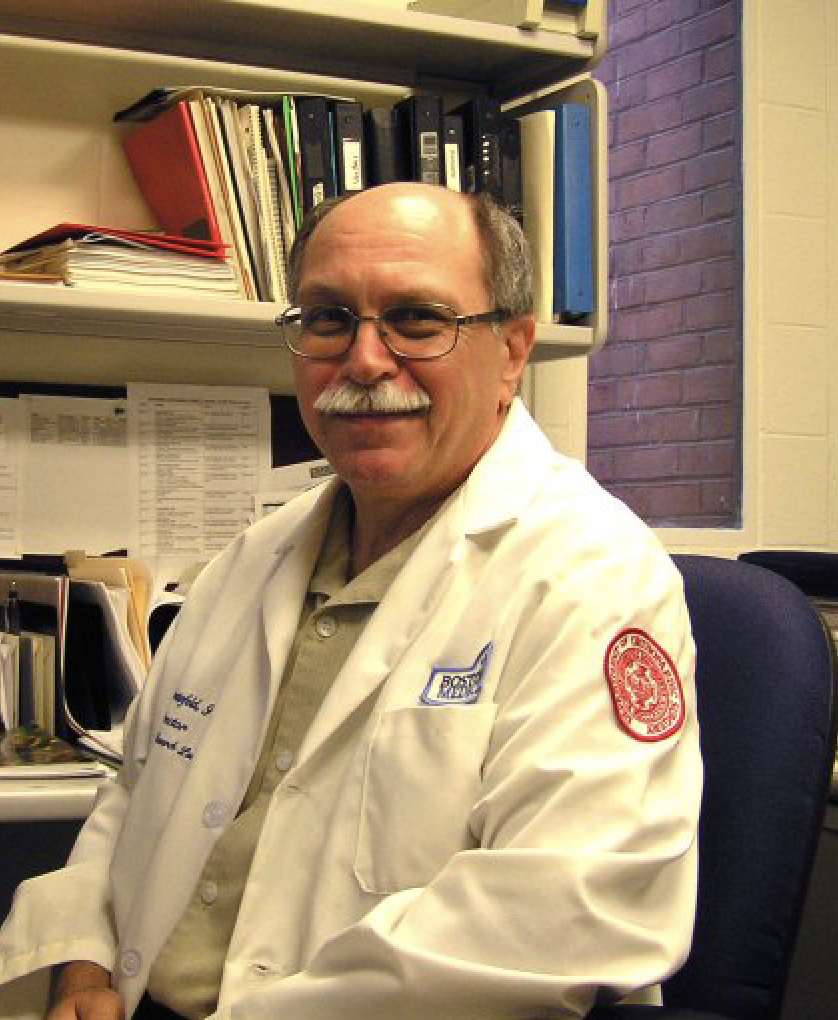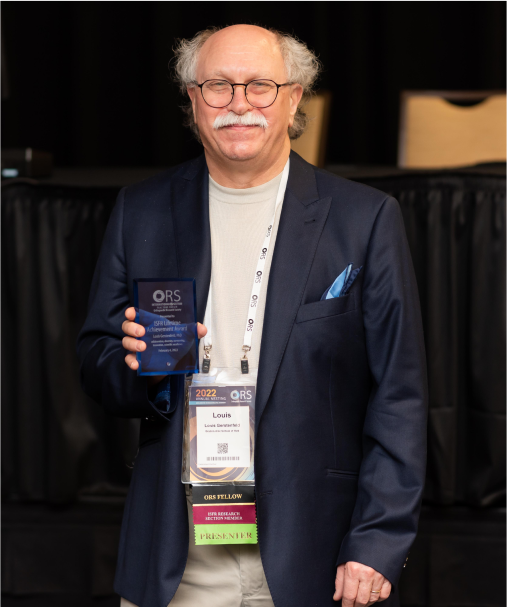Louis C. Gerstenfeld, PhD, Receives Lifetime Achievement Award
 The professor of orthopaedic surgery has been selected as the 2022 recipient of the inaugural Orthopaedic Research Society International Section of Fracture Repair (ISFR) Lifetime Achievement Award.
The professor of orthopaedic surgery has been selected as the 2022 recipient of the inaugural Orthopaedic Research Society International Section of Fracture Repair (ISFR) Lifetime Achievement Award.
Congratulations on being the 2022 recipient of the inaugural Orthopaedic Research Society International Section of Fracture Repair (ISFR) Lifetime Achievement Award! Can you tell us a little more about your research?
“I focus broadly on musculoskeletal diseases. Currently, the projects that I am focusing on relate to osteoporosis and fracture healing. Over the duration of my research, the focus has moved from molecular and cellular characteristics of cells that form bone to understanding human genetic variation that lead to differences in bone mass and relating these variations to the development of osteoporosis and fracture. To carry out these studies, I am currently collaborating both within BU and with other schools and institutions nationally. We relate known human genetic variations that lead to low bone mass to how those variants are presented in cells and effect bone tissue structure and mechanical properties. We assay the complement of genes expressed by bone cells then analyze the phenotypes of bone all within human tissue. The collaboration works with my surgical colleagues Dr. Kain and Dr. Freccero at BMC obtaining the surgical tissue from joint replacements where we get genetic material and bone tissues. My colleagues Dr. Morgan in the College of Engineering and Dr. Ferguson at the University of Colorado assess the tissue structure. The genetic analysis is then completed by my collaborator Dr. Farber at the University of Virginia. Simply put with this team, we can analyze bone tissues from genome to transcriptome to bone phenome.
The second project relates to figuring out why bone doesn’t heal after they are broken. Ten percent of people with broken bones don’t heal. Those that can’t and don’t heal are in lot of pain and can’t continue with their jobs. While we are able to use animal models to study fracture healing, the reality is that we don’t really have any direct information on humans because the only thing we can get is an X-ray and a questionnaire about how the patient is feeling during their healing.
 In this human study we are collecting data from a specific cohort that will break a part of their arm, the humerus. This is not usually treated with surgical repair because the broken humerus is put into a cast or sling so it’s the simplest kind of fracture repair to study. When the patient comes back to get an X-ray, we take a blood sample. We then analyze the blood sample to find serum markers in healing and non-healing patients. This is a study in collaboration with Dr. Demissie at the School of Public Health and co-directed by Dr. Tornetta Chairman of Orthopedic Surgery through a collaboration with the Major Extremity Trauma Research Consortium. The METRC is a network of clinical centers and trauma hospitals originally funded by the Department of Defense that is tasked with developing an understanding of best practices and new therapies to promote skeletal healing after injury. Dr. Tornetta has been involved with the METRC since its beginning and is a leading researcher in human fracture healing. This is the first study that is looking at both outcomes and treatments, that is a biological based study, trying to figure out biologic factors associated with in bone healing.”
In this human study we are collecting data from a specific cohort that will break a part of their arm, the humerus. This is not usually treated with surgical repair because the broken humerus is put into a cast or sling so it’s the simplest kind of fracture repair to study. When the patient comes back to get an X-ray, we take a blood sample. We then analyze the blood sample to find serum markers in healing and non-healing patients. This is a study in collaboration with Dr. Demissie at the School of Public Health and co-directed by Dr. Tornetta Chairman of Orthopedic Surgery through a collaboration with the Major Extremity Trauma Research Consortium. The METRC is a network of clinical centers and trauma hospitals originally funded by the Department of Defense that is tasked with developing an understanding of best practices and new therapies to promote skeletal healing after injury. Dr. Tornetta has been involved with the METRC since its beginning and is a leading researcher in human fracture healing. This is the first study that is looking at both outcomes and treatments, that is a biological based study, trying to figure out biologic factors associated with in bone healing.”
Research is obviously a huge part of your role here at BU. Another part of your role is co -directing the Biomedical Research Technology Master’s program in GMS. What’s your vision for the training that your students receive?
“I have been here from the inception of this Master’s program. This program is meant to provide masters students with hands on training and understanding of high-end technology. I believe it is important for students to have skill sets that allow them to be competitive in the job market and through this program I am advocating for technology.”
Could you speak to the benefits of being a part of GMS and BU School of Medicine?
“They are open and collegial. Is it so easy to find collaborators and participate in multi-investigator projects across multiple schools and institutions. GMS and BUSM engenders faculty to be involved in all aspects of teaching, learning, and research. For me, collegiality is the biggest thing. We are a big university but small community.”
Finally, do you have any advice for graduate students who might be considering a career that’s more research focused?
“Technology is always changing. You have to constantly be willing to reinvent yourself in terms of what you do and how you approach things. What is the newest technology? Look at the winners of Noble Prizes almost all are for technological innovations!”